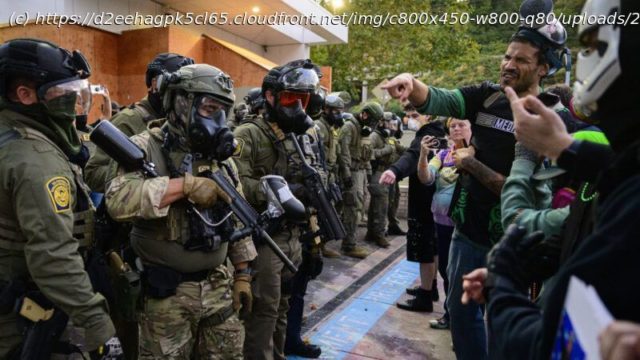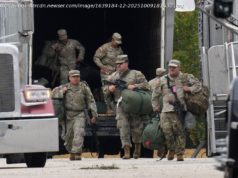U.S. District Judge Karin Immergut concluded that the president’s description of „War ravaged Portland“ was „simply untethered to the facts.“
U.S. District Judge Karin Immergut issued a temporary restraining order (TRO) against President Donald Trump’s deployment of federalized Oregon National Guard members in Portland. In response to a lawsuit by Oregon and the city of Portland, Immergut concluded that the deployment exceeded the president’s statutory authority and violated the state autonomy protected by the 10th Amendment.
Trump responded to that decision by ordering the deployment of federalized California and Texas National Guard troops to Portland. On Sunday, Immergut rejected that switcheroo, saying it was „in direct contravention of the court’s order issued yesterday.“ To underline that point, she expanded her TRO to cover „the relocation, federalization or deployment of members of the National Guard of any state or the District of Columbia in the state of Oregon.“
Since Trump himself appointed Immergut, it would be hard to characterize her TRO as the work of a „Radical Left Lunatic“ bent on obstructing his agenda for political reasons—his go-to explanation whenever judges rule against him. Rather, her decision upholds the principle that the president is not above the law, which in this case means he is not free to ignore the restrictions that Congress has imposed on his use of the National Guard.
„This case involves the intersection of three of the most fundamental principles in our
constitutional democracy“, Immergut writes in the opinion she issued when she approved the initial TRO. „The first concerns the relationship between the federal government and the states. The second concerns the relationship between the United States armed forces and domestic law enforcement. The third concerns the proper role of the judicial branch in ensuring that the executive branch complies with the laws and limitations imposed by the legislative branch. Whether we choose to follow what the Constitution mandates with respect to these three relationships goes to the heart of what it means to live under the rule of law in the United States.“
Trump presented the Portland deployment, which he announced in a Truth Social post on September 27, as a response to protests at the city’s Immigration and Customs Enforcement (ICE) facility. „At the request of [the] Secretary of Homeland Security, Kristi Noem“, he wrote, „I am directing [the] Secretary of War, Pete Hegseth, to provide all necessary Troops to protect War ravaged Portland, and any of our ICE Facilities under siege from attack by Antifa, and other domestic terrorists. I am also authorizing Full Force, if necessary. Thank you for your attention to this matter!“
As he did when he deployed California National Guard troops in response to Los Angeles protests against immigration raids in June, Trump invoked his authority under 10 USC 12406. That statute authorizes federalization of National Guard personnel in three circumstances: 1) when „the United States, or any of the Commonwealths or possessions, is invaded or is in danger of invasion by a foreign nation“; 2) when „there is a rebellion or danger of a rebellion against the authority of the Government of the United States“; or 3) when „the President is unable with the regular forces to execute the laws of the United States.“
Trump argues that both of the latter two conditions existed in Portland as of late September.
Start
United States
USA — Political Why a Trump Appointee Ruled That His National Guard Deployment in Portland...






